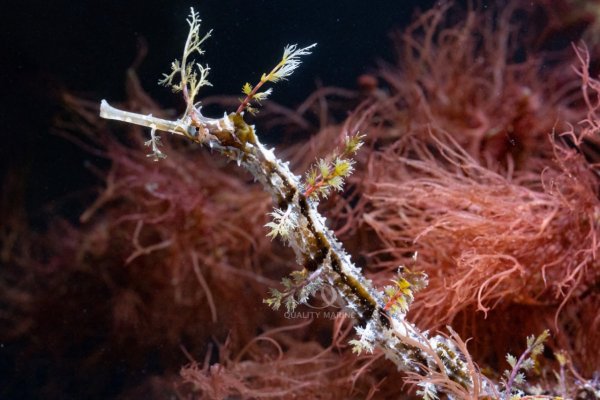Haliichthys is a genus that has only one fish in it, which is interesting because the word Haliichthys is rooted in two Greek words that translate roughly as “salt fish.” That's a pretty wide descriptor for a genus with only one fish. That one fish is a beauty though. Haliichthys taeniophorus is most often called the Ribboned Pipefish; it also gets called the Shredded Pipehorse, Ribboned Pipehorse, and Ribboned Seadragon, even though it is not a true Seadragon. As a side note, there are only three species of Seadragon (Phycodurus eques, Phyllopteryx taeniolatus, and Phyllypteryx dewysea - Leafy, Weedy, and Ruby respectively).
The tropical waters of Indonesia and Northern Australia make up the primary range of the Ribboned Pipefish. The lightest colored specimens (especially the bright green ones) are usually found in the shallowest water, often in areas of dense algal growth and seagrass beds where their natural camouflage is the most advantageous. Regardless of their color, they almost always found in less than 50 feet of water.
It is feeding the Ribboned Pipefish represents perhaps the greatest challenge in regard to their successful husbandry. They are not adept swimmers and will not be able to chase down prey very well, which is one of the primary reasons we recommend keeping them in smaller displays, with gentle flow. This combination of factors will help the home aquarist to get more food into the Pipefish's range more easily. New fish will sometimes require live food to get them started eating, and they will greedily take things like live Nutramar Artemia, live tubifex or when available, live mysis. We have a series of article on the site here about raising a wide variety of homegrown foods. Over time, Haliichthys taeniophorus can be conditioned to take thawed foods, by consistently offering things like Gamma Bloodworms, Mysis and a selection of gut loaded brine along with any live food you offer. Here they get three meals a day, and this is our suggestion as a minimum for you as well. In each feeding, feed them a small amount and wait for them to consume it, then feed a bit more. Many aquarists will dose this food with a baster which also helps direct it into the feeding zone of the Ribboned Pipefish. Once they are accustomed to thawed foods, they accept it consistently and easily. They should always be the only fish in the display as they can / will be easily outcompeted for food. Click here to learn more

The tropical waters of Indonesia and Northern Australia make up the primary range of the Ribboned Pipefish. The lightest colored specimens (especially the bright green ones) are usually found in the shallowest water, often in areas of dense algal growth and seagrass beds where their natural camouflage is the most advantageous. Regardless of their color, they almost always found in less than 50 feet of water.
It is feeding the Ribboned Pipefish represents perhaps the greatest challenge in regard to their successful husbandry. They are not adept swimmers and will not be able to chase down prey very well, which is one of the primary reasons we recommend keeping them in smaller displays, with gentle flow. This combination of factors will help the home aquarist to get more food into the Pipefish's range more easily. New fish will sometimes require live food to get them started eating, and they will greedily take things like live Nutramar Artemia, live tubifex or when available, live mysis. We have a series of article on the site here about raising a wide variety of homegrown foods. Over time, Haliichthys taeniophorus can be conditioned to take thawed foods, by consistently offering things like Gamma Bloodworms, Mysis and a selection of gut loaded brine along with any live food you offer. Here they get three meals a day, and this is our suggestion as a minimum for you as well. In each feeding, feed them a small amount and wait for them to consume it, then feed a bit more. Many aquarists will dose this food with a baster which also helps direct it into the feeding zone of the Ribboned Pipefish. Once they are accustomed to thawed foods, they accept it consistently and easily. They should always be the only fish in the display as they can / will be easily outcompeted for food. Click here to learn more












